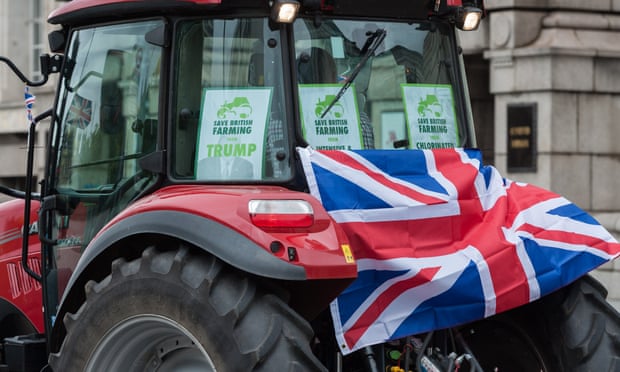
Ministers’ pledges to preserve the UK’s food and farming standards after Brexit will not prevent the import of lower-standard products and could spell potential disaster for Britain’s farmers, a report has found.
The government has repeatedly promised that a ban on chlorinated chicken and hormone-treated beef would remain in place after Brexit, and has made changes to the way future trade bills will be scrutinised. But ministers have refused to sign safeguards on imported food into law, despite pressure from consumers and civil society groups.
The headline bans on two products will still allow a large number of other lower-standard imports, while the changes to the way trade bills are managed are too weak to ensure a robust scrutiny of their impacts, according to the damning verdict of the Future British Standards Coalition (FBSC), which represents farmers and food producers, and animal welfare and green campaigners.
Facing a potential second rebellion by its own MPs on the agriculture bill, the government agreed to strengthen the scrutiny of future trade bills with an expanded trade and agriculture commission (TAC), a statutory body with powers to advise on bills for the next three years. This was hailed by the National Farmers’ Union as heading off potential problems with trade bills lowering import standards.
However, the FBSC found in a report on Friday that ministers would still have many powers to change the rules on food imports without parliamentary votes or robust scrutiny. Some standards on the use of antibiotics in farming, for instance, have already been scrapped, and rules governing the use of hormones on animals, and additives to food, will also be easier to alter.
The FBSC also found that the TAC under current plans would not include representatives with expertise on public health, environment, animal welfare and consumer protection.
Kath Dalmeny of the FBSC said she was “very positive” about the setting up of the TAC, but that it needed more powers and more expertise. She said “absolutely loads” of food products could be affected by a loosening of standards, done behind closed doors as part of trade deals. “There should be proper scrutiny, on issues such as antibiotic resistance, public health, [the impacts of products on] climate change and biodiversity loss,” she said.
Antibiotic resistance was a particular problem, she said. The UK has high standards to prevent the overuse of antibiotics, and antibiotic use in farming has fallen in recent years. But many other countries still use antibiotics prophylactically and as growth promoters, which encourage the growth of resistant superbugs. The lack of rules on imports means that without strict measures to prevent it, meat and other products containing superbugs that are resistant to antibiotics could be imported under future trade agreements, threatening to spread such pathogens to the UK.
“I think the government does not want its hands tied in any way when it goes into trade talks, so they have provided us with reassurances and advisory groups and given the impression that something robust is happening, but none of this holds anyone to account,” Dalmeny said.
Some of the impacts of lower-standard imports are also being felt on the climate. Deforestation in some areas means agricultural production is harming the climate: beef from Brazil, for instance, has a carbon footprint about five times greater than the equivalent produced in the UK.
Dalmeny called for ministers to strengthen safeguards by at least agreeing to widen the remit of the TAC, and ensure it is staffed with experts on the environment, public health and animal welfare as well as trade. “Consumers have consistently rejected the prospect of poorly produced food that hurts people, the planet and animals,” she said. “The government needs to show the public it is listening and taking advice from a wide range of experts.”
George Dunn, the chief executive of the Tenant Farmers Association, said: “The unity of voice across farming, environmental, animal welfare and public health groups underlines the imperative that the UK government does not drop the ball in reaching trade agreements which undermine domestic food production standards.
“Extending the tenure of the TAC will mean nothing if it is toothless, sidelined and ignored. Now is the time for the government to show that it is indeed determined to deliver its general election manifesto commitment to protect standards in trade.”





























